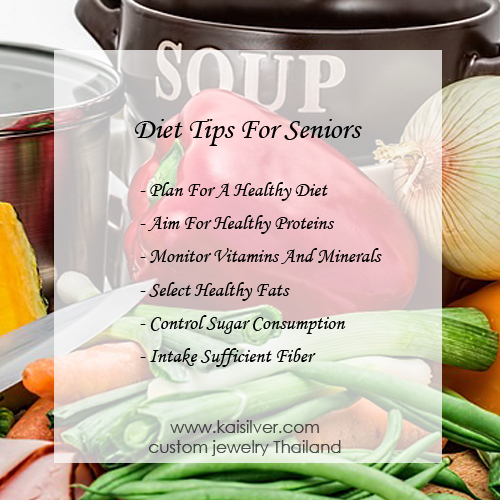Diet And Nutrition For Seniors
 The right diet can go a long way in keeping us more active and healthy as we grow older. If you happen to be a senior you would notice the changes that advancing age brings, adjustments in diet can help you better manage all those changes. Staying mentally sharp and maintaining a positive outlook are things that, become easier to achieve with the right type of food. In this report we present a bunch of very useful suggestions, use these to put together a food plan that works for you. If you have some special diet recommendations prescribed by your doctor, make sure that you do not make changes without consulting him or her.
The right diet can go a long way in keeping us more active and healthy as we grow older. If you happen to be a senior you would notice the changes that advancing age brings, adjustments in diet can help you better manage all those changes. Staying mentally sharp and maintaining a positive outlook are things that, become easier to achieve with the right type of food. In this report we present a bunch of very useful suggestions, use these to put together a food plan that works for you. If you have some special diet recommendations prescribed by your doctor, make sure that you do not make changes without consulting him or her.
Working On A Healthy Diet: Include more of food and vegetables in your diet, put together a colorful mix. Dark leafy vegetables, tomatoes, apples, bananas, pears, berries and melons are great. Vegetables like kale, spinach and broccoli are awesome and need to be featured more often in your meals. If you have a special requirement that involves controlling your sugar level, take your doctor’s advice before feasting on high sugar fruits. Possibilities of getting osteoporosis or suffering from broken bones increases with age, calcium intake plays a vital role in improving bone health. Milk, yoghurt, cheese, tofu, broccoli, kale and almonds are some food sources for getting calcium into your diet. Include grains in their ‘whole’ form, processed grains and flours can result in sharp spikes in blood sugar levels. Aim for healthy fats, we will talk in detail about good and bad fats in subsequent paras. Your protein requirements should be accounted for in your food plan. Older people suffering from kidney disorder or diabetes might get specific advice regarding protein intake from their medical adviser. We talk about healthy protein sources for senior men and women in the next paragraph.
Aim For Healthy Proteins: Lack of sufficient protein in the diet can lead to a number of problems in older people. Getting moody and slipping into depression, unexplained stress and anxiety and hampered thinking, can all be the effect of insufficient protein intake. At the same time filling up on unhealthy protein from highly processed meat based products, can trigger serious health problems like cancer and heart related ailments. Red meat is not the only source for protein, vary your diet and include foods like fish, beans, peas, eggs, nuts, milk and cheese. If you must eat red meat, try to source meat from farms that feed their animals on organically grown grass. Processed carbohydrates like cakes, pastries and cookies should be eaten sparingly, older people should get into the habit of ignoring such foodstuffs.
Vitamins And Minerals: Older men and women often ignore feelings like thirst, this can result in insufficient water intake. Make sure that you sip water regularly, it can go a long way in eliminating problems like urinary tract infections and constipation. It is not uncommon for seniors to suffer from mental confusion due to severe dehydration. Advancing age can reduce the efficiency of the body to absorb Vitamin B12, this vitamin plays a prominent role in keeping blood and nerves healthy. Your doctor might advise the intake of Vitamin B supplements, make sure that you follow those recommendations. Bone related problems can begin to appear or get aggravated as men and women grow older, Vitamin D has a positive role to play in bone health. Seek advice from your doctor, regarding Vitamin supplements to fulfill your daily requirements of Vitamin D.
Selecting Healthy Fats: Not all fat is bad, many functions of the body require fat and the absence of body fat can result in various diseases. Fats help stabilize moods and also have a role to play in brain function. Going by the opinion of most medical experts, you should focus on monounsaturated fats and polyunsaturated fats. Without getting into technical explanations, here are some good food sources for these fat types. Monounsaturated fats are found in olive oil, avocados, almonds, hazelnuts, pecans, pumpkin seeds and sesame seeds. Polyunsaturated fats which include the highly desirable Omega-3 fatty acids, are found in salmon, herring and mackerel. Medical research supports the claim that, flaxseeds, walnuts and chia seeds are also good sources for Omega-3 fatty acids. The general claim is that saturated fats and trans fats are often to blame for strokes and heart disorders. Stay away from bakery items like cakes and cookies, donuts can be high in both sugar and unhealthy fats.
Control Sugar Intake: High sugar levels are often the cause of various health problems seen in ageing men and women. Plain sugar and other refined carbs like white rice and white flour, can result in sharp spikes in blood sugar levels. In the next stage the high sugar levels crash rapidly, you then feel hungry and tend to overeat. Older men and women should make deliberate attempts to reduce sugar in their diet. Fruits can often be a good substitute for satisfying your desire to eat something sweet. Keep a watch for very sweet fruits like ripe mangoes, lynches and durian – avoid them if you have a medical requirement to lower sugar intake, in any case make sure that you eat these fruits in moderation. Complex carbs have significant fiber content, this helps control the release of sugar into the bloodstream. Diets for seniors are healthier when they include foods like whole oatmeal, dark beans and vegetables. Complex carbs keep you feeling full for a longer time, you also end up feeling more energetic and active. Keep in mind that sodas and sweetened beverages can contain high proportions of sugar.
Increase Intake Of Fiber: It is quite possible that the efficiency of the digestive system lowers with age, fiber becomes all the more important for senior men and women. It is generally seen that older people do not give sufficient importance to fiber in their food. Include whole grains, cereals, barley, oatmeal, beans and nuts in your daily diet. Fruits and vegetables like carrots, celery and tomatoes are also a good source for dietary fiber. Fruit juices are better replaced with whole fruits and salads can be made more healthy and pretty, by adding nuts, seeds or beans. You can also begin your day on a healthy note by, having a bowl of high fiber whole grain cereal for breakfast.
As you plan and configure your food list and diet to work well for you, don’t be confused with the lengthy information provided above in this report. We have tried to be as comprehensive as possible, you can gradually implement changes into your diet. This approach will allow you to slowly adapt to the changes. Attempting everything at one go is unlikely to be successful. Many older people make drastic cuts in their food consumption as they age, this is not right and can lead to several health worries. You must eat sufficient food and focus on getting the right nutrients. Older people who live and eat alone are more likely to be careless about, their food intake and requirements. Try to form a group that takes pleasure in cooking, the members of the group can then sit down together to enjoy the healthy food dishes made by everyone.
Note: Let us end this report by saying that, any change in diet, exercise or sleep pattern should be discussed with your family doctor. None of the information provided here is aimed at replacing (wholly or partially) the need for professional medical advice.
